MSW: Ecological Model and Crisis Intervention in Social Work Practice
VerifiedAdded on 2023/06/11
|10
|2492
|128
Report
AI Summary
This report provides a critical analysis and assessment of social work practice, focusing on the ecological model and crisis intervention theories. It includes an interview assessment with an international student, Kalpana, who expresses concerns about loneliness and social inclusion. The report explores how the mesosystem, within the ecological model, relates to Kalpana's isolation and how crisis intervention theories can be applied to address her emotional distress. Various levels of crisis intervention theories, including basic and expanded theories, are discussed in relation to Kalpana's situation, emphasizing the importance of addressing her feelings of loneliness, depression, and homesickness. The report concludes with a reflection on the assessment process, highlighting the significance of socialization and engagement in activities to combat loneliness and improve psychological well-being. Desklib provides a platform for students to access similar solved assignments.
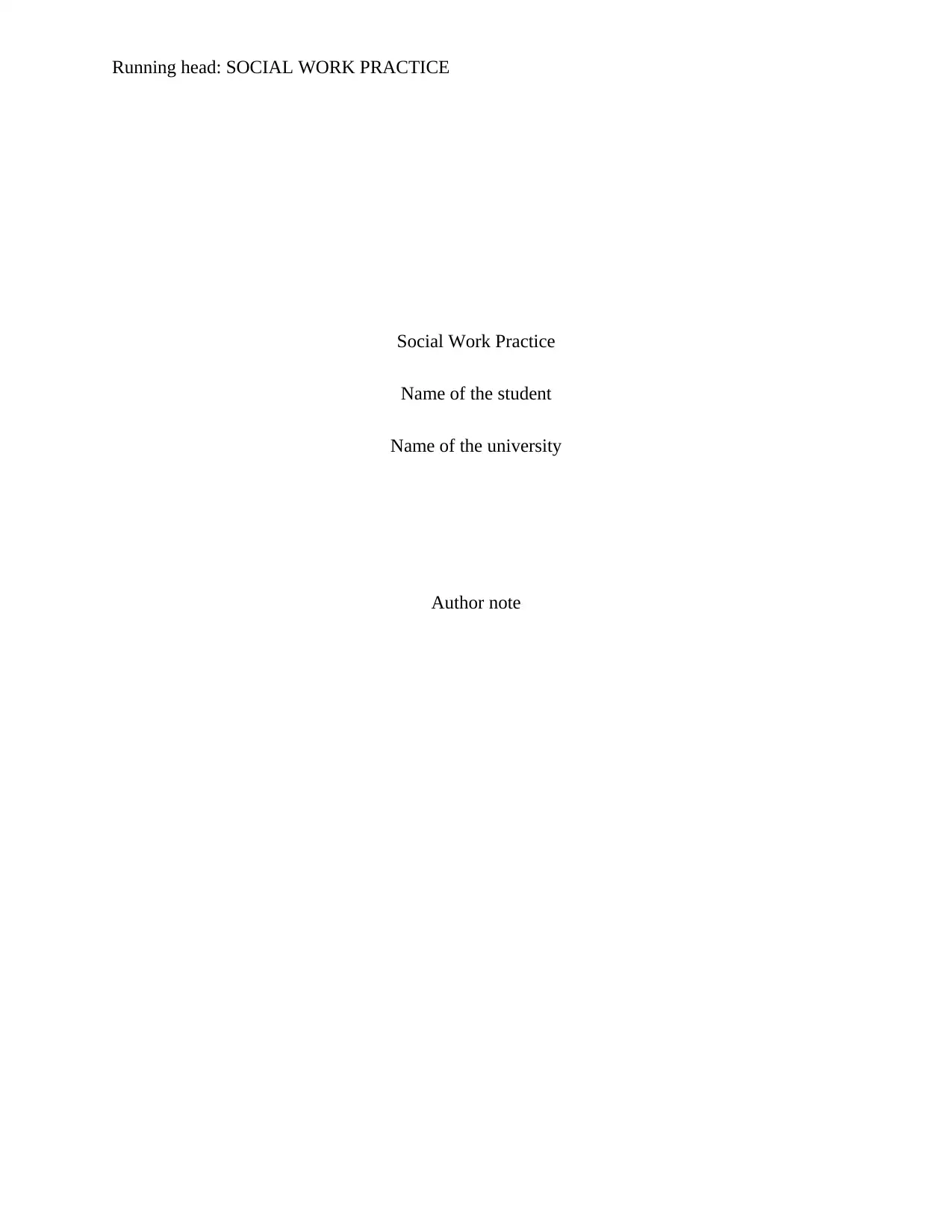
Running head: SOCIAL WORK PRACTICE
Social Work Practice
Name of the student
Name of the university
Author note
Social Work Practice
Name of the student
Name of the university
Author note
Paraphrase This Document
Need a fresh take? Get an instant paraphrase of this document with our AI Paraphraser
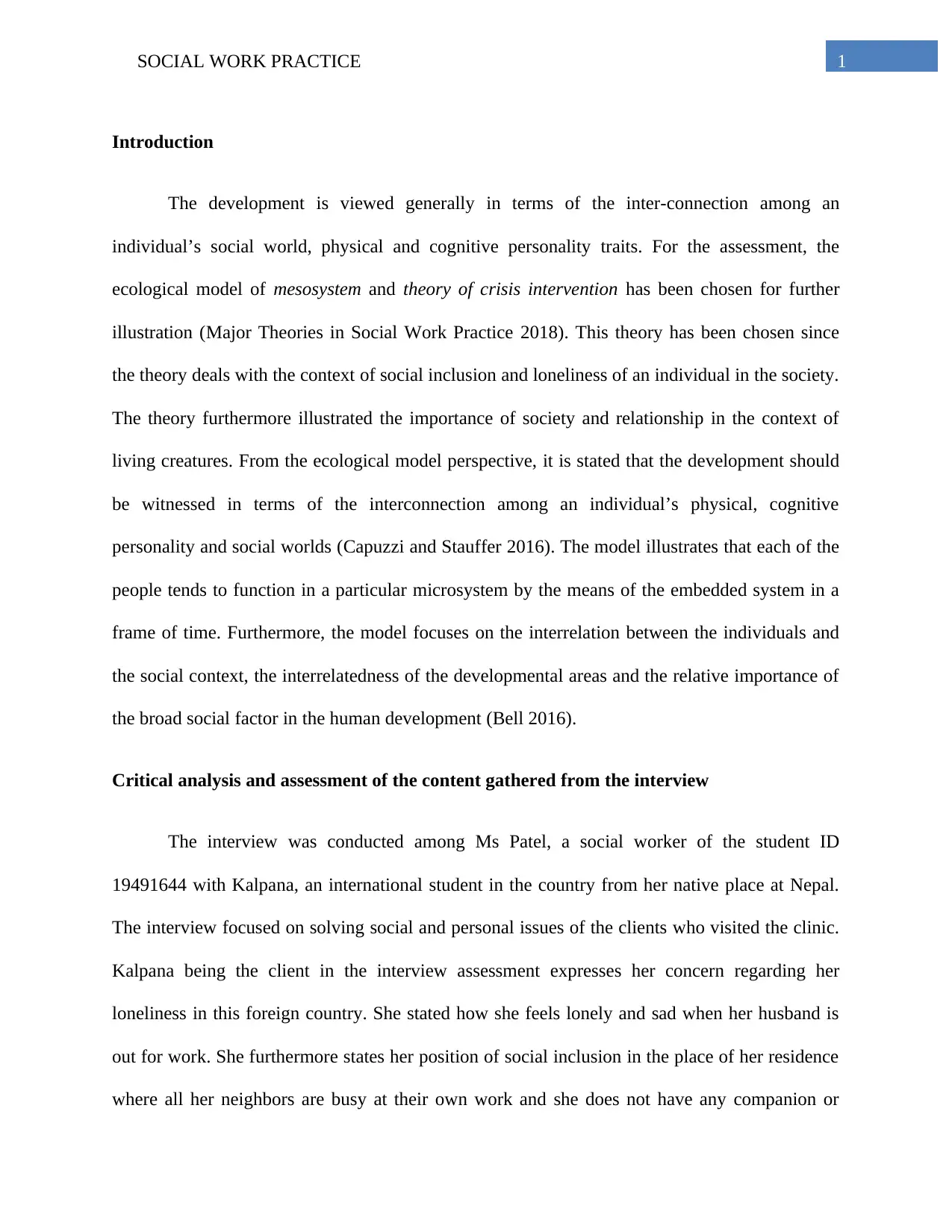
1SOCIAL WORK PRACTICE
Introduction
The development is viewed generally in terms of the inter-connection among an
individual’s social world, physical and cognitive personality traits. For the assessment, the
ecological model of mesosystem and theory of crisis intervention has been chosen for further
illustration (Major Theories in Social Work Practice 2018). This theory has been chosen since
the theory deals with the context of social inclusion and loneliness of an individual in the society.
The theory furthermore illustrated the importance of society and relationship in the context of
living creatures. From the ecological model perspective, it is stated that the development should
be witnessed in terms of the interconnection among an individual’s physical, cognitive
personality and social worlds (Capuzzi and Stauffer 2016). The model illustrates that each of the
people tends to function in a particular microsystem by the means of the embedded system in a
frame of time. Furthermore, the model focuses on the interrelation between the individuals and
the social context, the interrelatedness of the developmental areas and the relative importance of
the broad social factor in the human development (Bell 2016).
Critical analysis and assessment of the content gathered from the interview
The interview was conducted among Ms Patel, a social worker of the student ID
19491644 with Kalpana, an international student in the country from her native place at Nepal.
The interview focused on solving social and personal issues of the clients who visited the clinic.
Kalpana being the client in the interview assessment expresses her concern regarding her
loneliness in this foreign country. She stated how she feels lonely and sad when her husband is
out for work. She furthermore states her position of social inclusion in the place of her residence
where all her neighbors are busy at their own work and she does not have any companion or
Introduction
The development is viewed generally in terms of the inter-connection among an
individual’s social world, physical and cognitive personality traits. For the assessment, the
ecological model of mesosystem and theory of crisis intervention has been chosen for further
illustration (Major Theories in Social Work Practice 2018). This theory has been chosen since
the theory deals with the context of social inclusion and loneliness of an individual in the society.
The theory furthermore illustrated the importance of society and relationship in the context of
living creatures. From the ecological model perspective, it is stated that the development should
be witnessed in terms of the interconnection among an individual’s physical, cognitive
personality and social worlds (Capuzzi and Stauffer 2016). The model illustrates that each of the
people tends to function in a particular microsystem by the means of the embedded system in a
frame of time. Furthermore, the model focuses on the interrelation between the individuals and
the social context, the interrelatedness of the developmental areas and the relative importance of
the broad social factor in the human development (Bell 2016).
Critical analysis and assessment of the content gathered from the interview
The interview was conducted among Ms Patel, a social worker of the student ID
19491644 with Kalpana, an international student in the country from her native place at Nepal.
The interview focused on solving social and personal issues of the clients who visited the clinic.
Kalpana being the client in the interview assessment expresses her concern regarding her
loneliness in this foreign country. She stated how she feels lonely and sad when her husband is
out for work. She furthermore states her position of social inclusion in the place of her residence
where all her neighbors are busy at their own work and she does not have any companion or
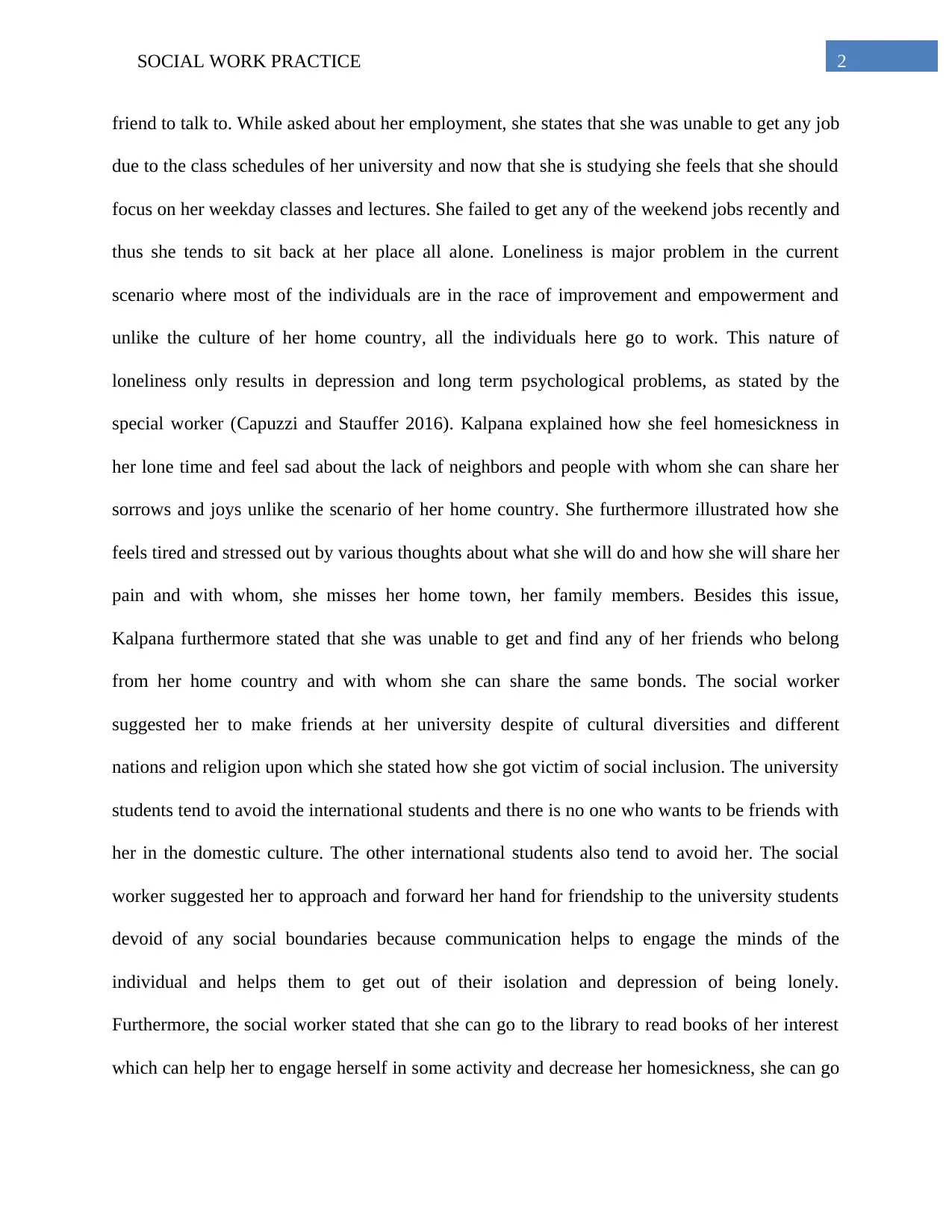
2SOCIAL WORK PRACTICE
friend to talk to. While asked about her employment, she states that she was unable to get any job
due to the class schedules of her university and now that she is studying she feels that she should
focus on her weekday classes and lectures. She failed to get any of the weekend jobs recently and
thus she tends to sit back at her place all alone. Loneliness is major problem in the current
scenario where most of the individuals are in the race of improvement and empowerment and
unlike the culture of her home country, all the individuals here go to work. This nature of
loneliness only results in depression and long term psychological problems, as stated by the
special worker (Capuzzi and Stauffer 2016). Kalpana explained how she feel homesickness in
her lone time and feel sad about the lack of neighbors and people with whom she can share her
sorrows and joys unlike the scenario of her home country. She furthermore illustrated how she
feels tired and stressed out by various thoughts about what she will do and how she will share her
pain and with whom, she misses her home town, her family members. Besides this issue,
Kalpana furthermore stated that she was unable to get and find any of her friends who belong
from her home country and with whom she can share the same bonds. The social worker
suggested her to make friends at her university despite of cultural diversities and different
nations and religion upon which she stated how she got victim of social inclusion. The university
students tend to avoid the international students and there is no one who wants to be friends with
her in the domestic culture. The other international students also tend to avoid her. The social
worker suggested her to approach and forward her hand for friendship to the university students
devoid of any social boundaries because communication helps to engage the minds of the
individual and helps them to get out of their isolation and depression of being lonely.
Furthermore, the social worker stated that she can go to the library to read books of her interest
which can help her to engage herself in some activity and decrease her homesickness, she can go
friend to talk to. While asked about her employment, she states that she was unable to get any job
due to the class schedules of her university and now that she is studying she feels that she should
focus on her weekday classes and lectures. She failed to get any of the weekend jobs recently and
thus she tends to sit back at her place all alone. Loneliness is major problem in the current
scenario where most of the individuals are in the race of improvement and empowerment and
unlike the culture of her home country, all the individuals here go to work. This nature of
loneliness only results in depression and long term psychological problems, as stated by the
special worker (Capuzzi and Stauffer 2016). Kalpana explained how she feel homesickness in
her lone time and feel sad about the lack of neighbors and people with whom she can share her
sorrows and joys unlike the scenario of her home country. She furthermore illustrated how she
feels tired and stressed out by various thoughts about what she will do and how she will share her
pain and with whom, she misses her home town, her family members. Besides this issue,
Kalpana furthermore stated that she was unable to get and find any of her friends who belong
from her home country and with whom she can share the same bonds. The social worker
suggested her to make friends at her university despite of cultural diversities and different
nations and religion upon which she stated how she got victim of social inclusion. The university
students tend to avoid the international students and there is no one who wants to be friends with
her in the domestic culture. The other international students also tend to avoid her. The social
worker suggested her to approach and forward her hand for friendship to the university students
devoid of any social boundaries because communication helps to engage the minds of the
individual and helps them to get out of their isolation and depression of being lonely.
Furthermore, the social worker stated that she can go to the library to read books of her interest
which can help her to engage herself in some activity and decrease her homesickness, she can go
⊘ This is a preview!⊘
Do you want full access?
Subscribe today to unlock all pages.

Trusted by 1+ million students worldwide
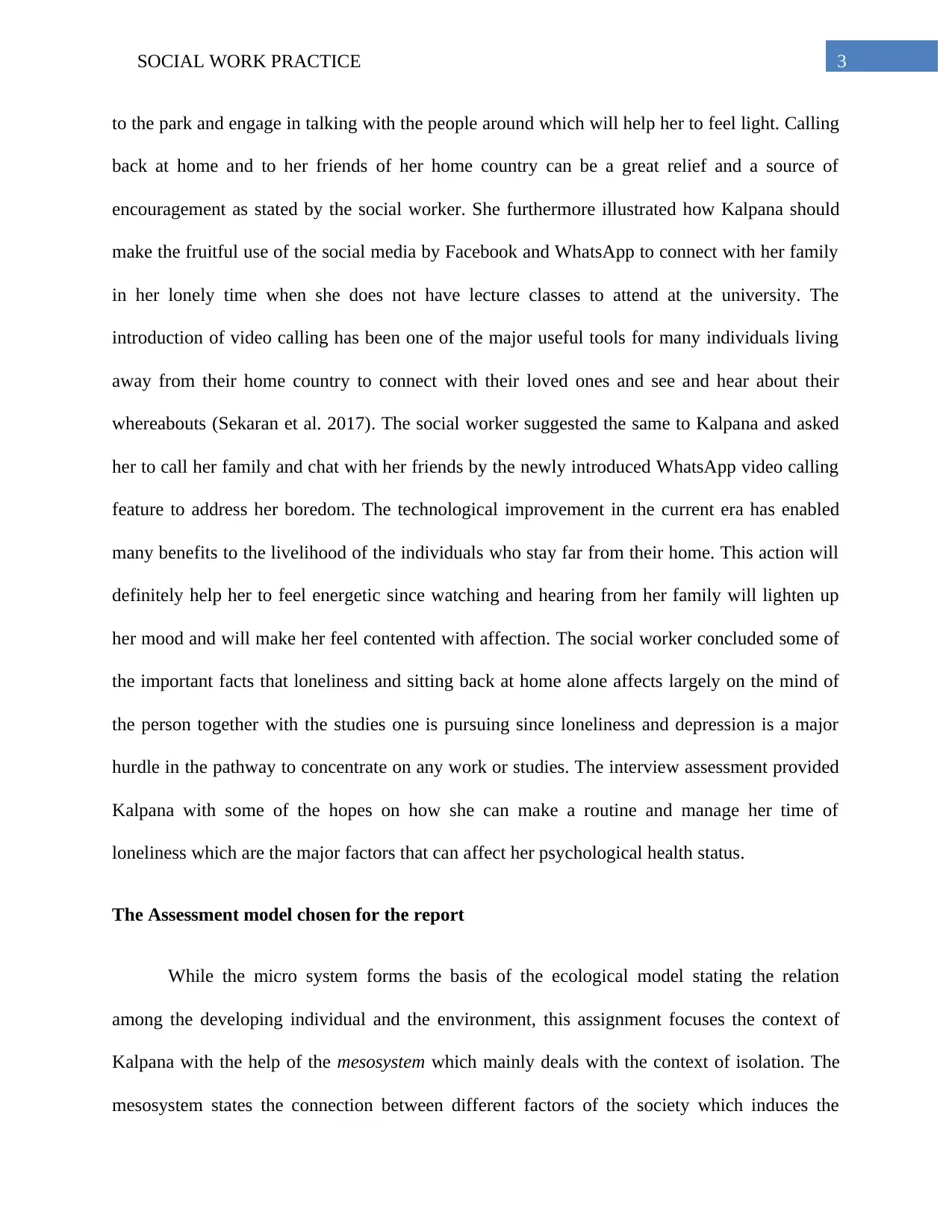
3SOCIAL WORK PRACTICE
to the park and engage in talking with the people around which will help her to feel light. Calling
back at home and to her friends of her home country can be a great relief and a source of
encouragement as stated by the social worker. She furthermore illustrated how Kalpana should
make the fruitful use of the social media by Facebook and WhatsApp to connect with her family
in her lonely time when she does not have lecture classes to attend at the university. The
introduction of video calling has been one of the major useful tools for many individuals living
away from their home country to connect with their loved ones and see and hear about their
whereabouts (Sekaran et al. 2017). The social worker suggested the same to Kalpana and asked
her to call her family and chat with her friends by the newly introduced WhatsApp video calling
feature to address her boredom. The technological improvement in the current era has enabled
many benefits to the livelihood of the individuals who stay far from their home. This action will
definitely help her to feel energetic since watching and hearing from her family will lighten up
her mood and will make her feel contented with affection. The social worker concluded some of
the important facts that loneliness and sitting back at home alone affects largely on the mind of
the person together with the studies one is pursuing since loneliness and depression is a major
hurdle in the pathway to concentrate on any work or studies. The interview assessment provided
Kalpana with some of the hopes on how she can make a routine and manage her time of
loneliness which are the major factors that can affect her psychological health status.
The Assessment model chosen for the report
While the micro system forms the basis of the ecological model stating the relation
among the developing individual and the environment, this assignment focuses the context of
Kalpana with the help of the mesosystem which mainly deals with the context of isolation. The
mesosystem states the connection between different factors of the society which induces the
to the park and engage in talking with the people around which will help her to feel light. Calling
back at home and to her friends of her home country can be a great relief and a source of
encouragement as stated by the social worker. She furthermore illustrated how Kalpana should
make the fruitful use of the social media by Facebook and WhatsApp to connect with her family
in her lonely time when she does not have lecture classes to attend at the university. The
introduction of video calling has been one of the major useful tools for many individuals living
away from their home country to connect with their loved ones and see and hear about their
whereabouts (Sekaran et al. 2017). The social worker suggested the same to Kalpana and asked
her to call her family and chat with her friends by the newly introduced WhatsApp video calling
feature to address her boredom. The technological improvement in the current era has enabled
many benefits to the livelihood of the individuals who stay far from their home. This action will
definitely help her to feel energetic since watching and hearing from her family will lighten up
her mood and will make her feel contented with affection. The social worker concluded some of
the important facts that loneliness and sitting back at home alone affects largely on the mind of
the person together with the studies one is pursuing since loneliness and depression is a major
hurdle in the pathway to concentrate on any work or studies. The interview assessment provided
Kalpana with some of the hopes on how she can make a routine and manage her time of
loneliness which are the major factors that can affect her psychological health status.
The Assessment model chosen for the report
While the micro system forms the basis of the ecological model stating the relation
among the developing individual and the environment, this assignment focuses the context of
Kalpana with the help of the mesosystem which mainly deals with the context of isolation. The
mesosystem states the connection between different factors of the society which induces the
Paraphrase This Document
Need a fresh take? Get an instant paraphrase of this document with our AI Paraphraser
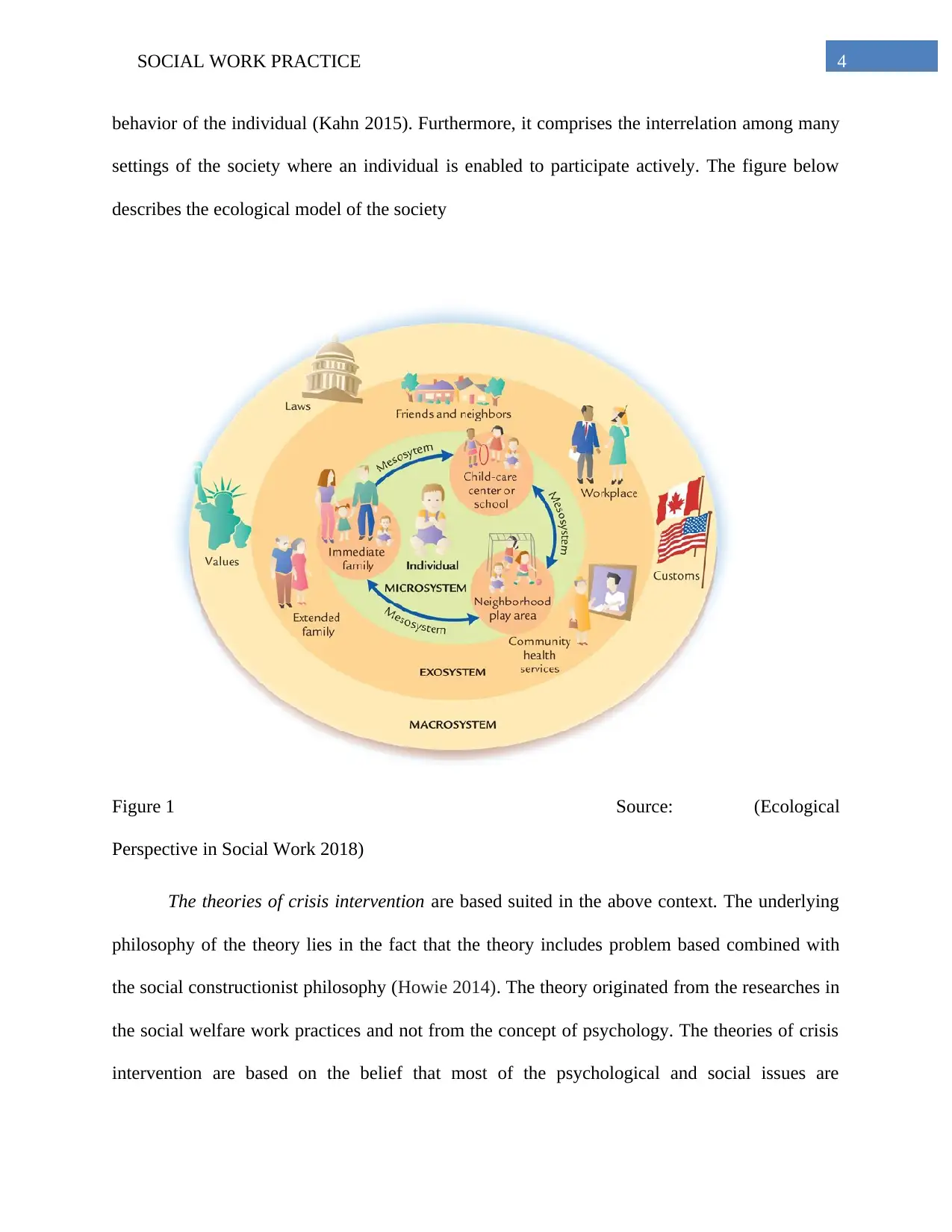
4SOCIAL WORK PRACTICE
behavior of the individual (Kahn 2015). Furthermore, it comprises the interrelation among many
settings of the society where an individual is enabled to participate actively. The figure below
describes the ecological model of the society
Figure 1 Source: (Ecological
Perspective in Social Work 2018)
The theories of crisis intervention are based suited in the above context. The underlying
philosophy of the theory lies in the fact that the theory includes problem based combined with
the social constructionist philosophy (Howie 2014). The theory originated from the researches in
the social welfare work practices and not from the concept of psychology. The theories of crisis
intervention are based on the belief that most of the psychological and social issues are
behavior of the individual (Kahn 2015). Furthermore, it comprises the interrelation among many
settings of the society where an individual is enabled to participate actively. The figure below
describes the ecological model of the society
Figure 1 Source: (Ecological
Perspective in Social Work 2018)
The theories of crisis intervention are based suited in the above context. The underlying
philosophy of the theory lies in the fact that the theory includes problem based combined with
the social constructionist philosophy (Howie 2014). The theory originated from the researches in
the social welfare work practices and not from the concept of psychology. The theories of crisis
intervention are based on the belief that most of the psychological and social issues are
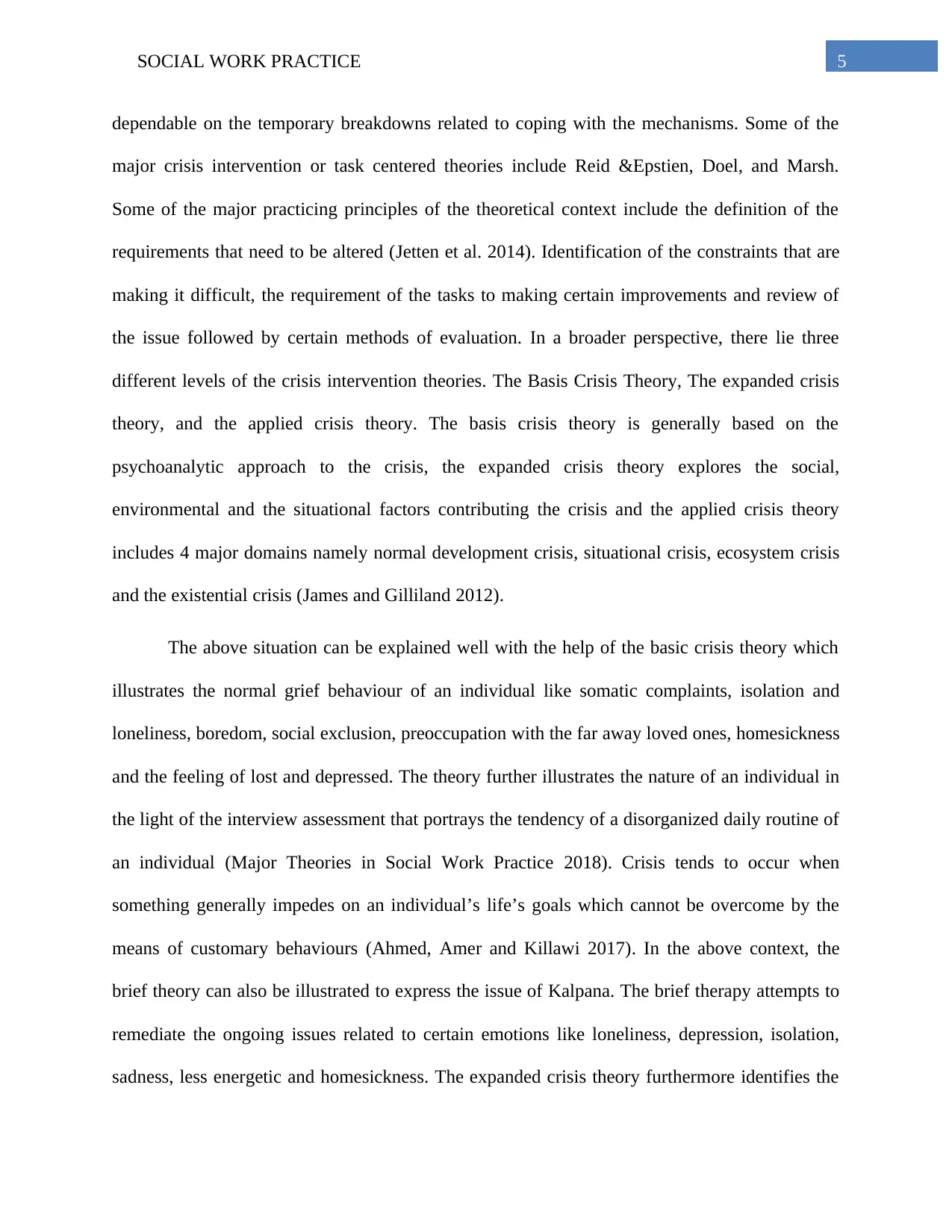
5SOCIAL WORK PRACTICE
dependable on the temporary breakdowns related to coping with the mechanisms. Some of the
major crisis intervention or task centered theories include Reid &Epstien, Doel, and Marsh.
Some of the major practicing principles of the theoretical context include the definition of the
requirements that need to be altered (Jetten et al. 2014). Identification of the constraints that are
making it difficult, the requirement of the tasks to making certain improvements and review of
the issue followed by certain methods of evaluation. In a broader perspective, there lie three
different levels of the crisis intervention theories. The Basis Crisis Theory, The expanded crisis
theory, and the applied crisis theory. The basis crisis theory is generally based on the
psychoanalytic approach to the crisis, the expanded crisis theory explores the social,
environmental and the situational factors contributing the crisis and the applied crisis theory
includes 4 major domains namely normal development crisis, situational crisis, ecosystem crisis
and the existential crisis (James and Gilliland 2012).
The above situation can be explained well with the help of the basic crisis theory which
illustrates the normal grief behaviour of an individual like somatic complaints, isolation and
loneliness, boredom, social exclusion, preoccupation with the far away loved ones, homesickness
and the feeling of lost and depressed. The theory further illustrates the nature of an individual in
the light of the interview assessment that portrays the tendency of a disorganized daily routine of
an individual (Major Theories in Social Work Practice 2018). Crisis tends to occur when
something generally impedes on an individual’s life’s goals which cannot be overcome by the
means of customary behaviours (Ahmed, Amer and Killawi 2017). In the above context, the
brief theory can also be illustrated to express the issue of Kalpana. The brief therapy attempts to
remediate the ongoing issues related to certain emotions like loneliness, depression, isolation,
sadness, less energetic and homesickness. The expanded crisis theory furthermore identifies the
dependable on the temporary breakdowns related to coping with the mechanisms. Some of the
major crisis intervention or task centered theories include Reid &Epstien, Doel, and Marsh.
Some of the major practicing principles of the theoretical context include the definition of the
requirements that need to be altered (Jetten et al. 2014). Identification of the constraints that are
making it difficult, the requirement of the tasks to making certain improvements and review of
the issue followed by certain methods of evaluation. In a broader perspective, there lie three
different levels of the crisis intervention theories. The Basis Crisis Theory, The expanded crisis
theory, and the applied crisis theory. The basis crisis theory is generally based on the
psychoanalytic approach to the crisis, the expanded crisis theory explores the social,
environmental and the situational factors contributing the crisis and the applied crisis theory
includes 4 major domains namely normal development crisis, situational crisis, ecosystem crisis
and the existential crisis (James and Gilliland 2012).
The above situation can be explained well with the help of the basic crisis theory which
illustrates the normal grief behaviour of an individual like somatic complaints, isolation and
loneliness, boredom, social exclusion, preoccupation with the far away loved ones, homesickness
and the feeling of lost and depressed. The theory further illustrates the nature of an individual in
the light of the interview assessment that portrays the tendency of a disorganized daily routine of
an individual (Major Theories in Social Work Practice 2018). Crisis tends to occur when
something generally impedes on an individual’s life’s goals which cannot be overcome by the
means of customary behaviours (Ahmed, Amer and Killawi 2017). In the above context, the
brief theory can also be illustrated to express the issue of Kalpana. The brief therapy attempts to
remediate the ongoing issues related to certain emotions like loneliness, depression, isolation,
sadness, less energetic and homesickness. The expanded crisis theory furthermore identifies the
⊘ This is a preview!⊘
Do you want full access?
Subscribe today to unlock all pages.

Trusted by 1+ million students worldwide
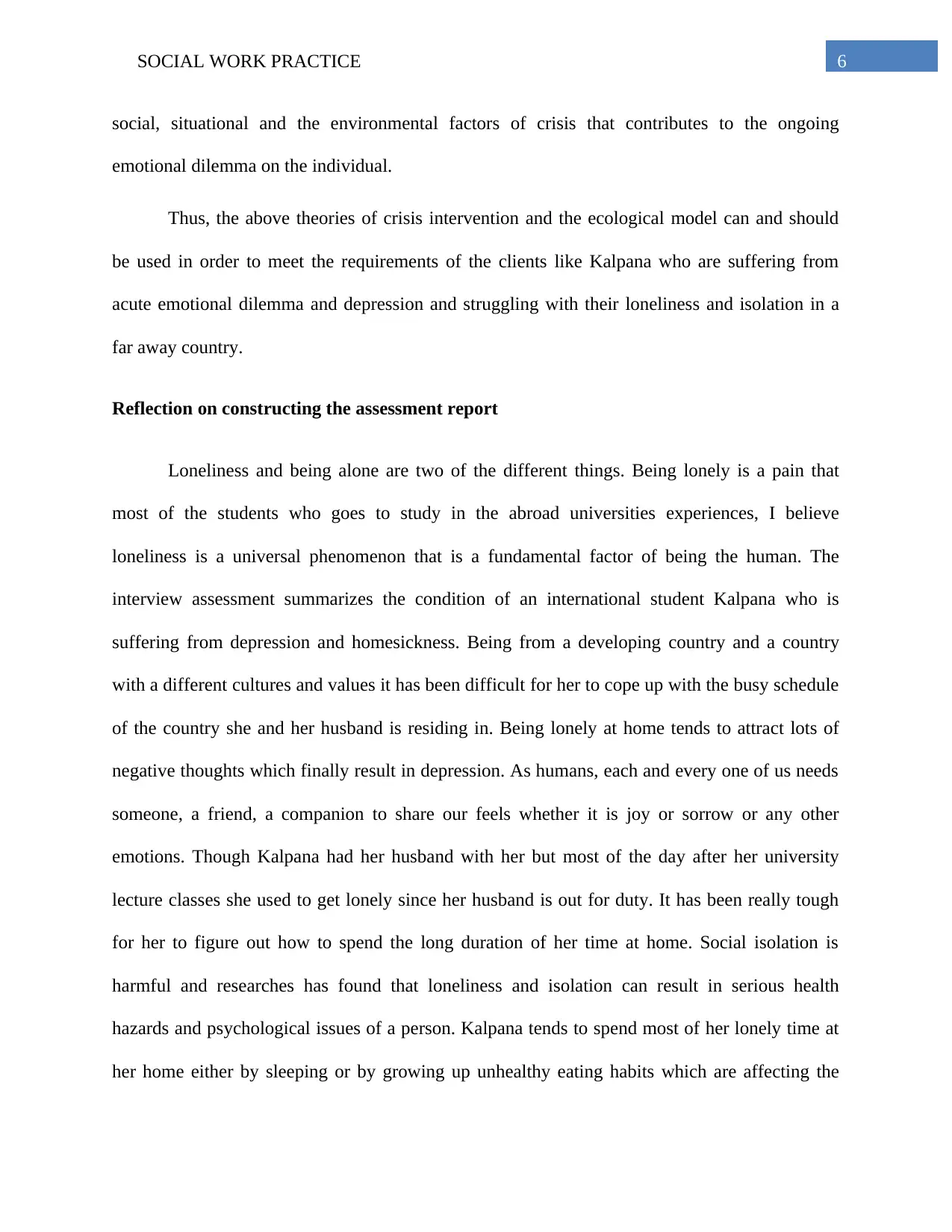
6SOCIAL WORK PRACTICE
social, situational and the environmental factors of crisis that contributes to the ongoing
emotional dilemma on the individual.
Thus, the above theories of crisis intervention and the ecological model can and should
be used in order to meet the requirements of the clients like Kalpana who are suffering from
acute emotional dilemma and depression and struggling with their loneliness and isolation in a
far away country.
Reflection on constructing the assessment report
Loneliness and being alone are two of the different things. Being lonely is a pain that
most of the students who goes to study in the abroad universities experiences, I believe
loneliness is a universal phenomenon that is a fundamental factor of being the human. The
interview assessment summarizes the condition of an international student Kalpana who is
suffering from depression and homesickness. Being from a developing country and a country
with a different cultures and values it has been difficult for her to cope up with the busy schedule
of the country she and her husband is residing in. Being lonely at home tends to attract lots of
negative thoughts which finally result in depression. As humans, each and every one of us needs
someone, a friend, a companion to share our feels whether it is joy or sorrow or any other
emotions. Though Kalpana had her husband with her but most of the day after her university
lecture classes she used to get lonely since her husband is out for duty. It has been really tough
for her to figure out how to spend the long duration of her time at home. Social isolation is
harmful and researches has found that loneliness and isolation can result in serious health
hazards and psychological issues of a person. Kalpana tends to spend most of her lonely time at
her home either by sleeping or by growing up unhealthy eating habits which are affecting the
social, situational and the environmental factors of crisis that contributes to the ongoing
emotional dilemma on the individual.
Thus, the above theories of crisis intervention and the ecological model can and should
be used in order to meet the requirements of the clients like Kalpana who are suffering from
acute emotional dilemma and depression and struggling with their loneliness and isolation in a
far away country.
Reflection on constructing the assessment report
Loneliness and being alone are two of the different things. Being lonely is a pain that
most of the students who goes to study in the abroad universities experiences, I believe
loneliness is a universal phenomenon that is a fundamental factor of being the human. The
interview assessment summarizes the condition of an international student Kalpana who is
suffering from depression and homesickness. Being from a developing country and a country
with a different cultures and values it has been difficult for her to cope up with the busy schedule
of the country she and her husband is residing in. Being lonely at home tends to attract lots of
negative thoughts which finally result in depression. As humans, each and every one of us needs
someone, a friend, a companion to share our feels whether it is joy or sorrow or any other
emotions. Though Kalpana had her husband with her but most of the day after her university
lecture classes she used to get lonely since her husband is out for duty. It has been really tough
for her to figure out how to spend the long duration of her time at home. Social isolation is
harmful and researches has found that loneliness and isolation can result in serious health
hazards and psychological issues of a person. Kalpana tends to spend most of her lonely time at
her home either by sleeping or by growing up unhealthy eating habits which are affecting the
Paraphrase This Document
Need a fresh take? Get an instant paraphrase of this document with our AI Paraphraser
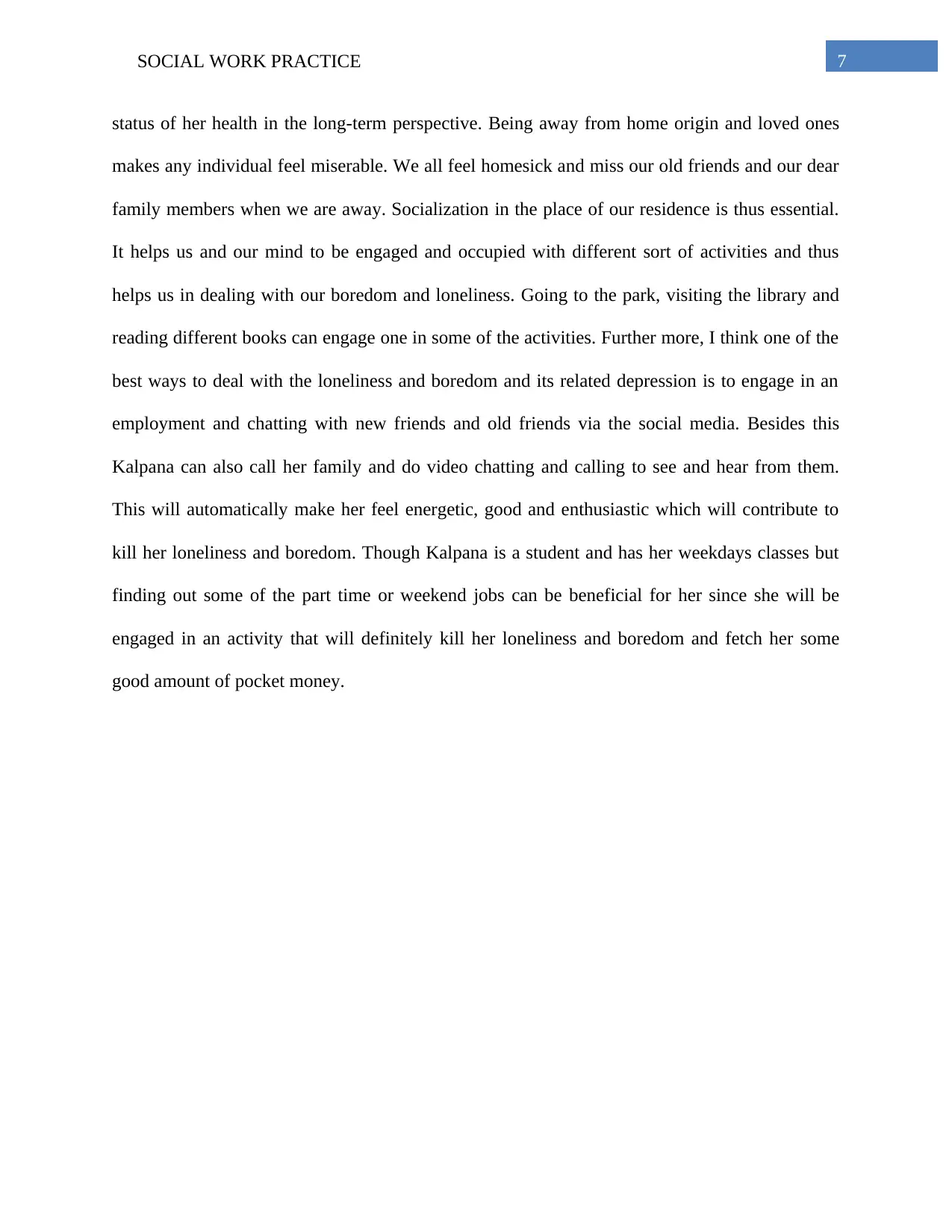
7SOCIAL WORK PRACTICE
status of her health in the long-term perspective. Being away from home origin and loved ones
makes any individual feel miserable. We all feel homesick and miss our old friends and our dear
family members when we are away. Socialization in the place of our residence is thus essential.
It helps us and our mind to be engaged and occupied with different sort of activities and thus
helps us in dealing with our boredom and loneliness. Going to the park, visiting the library and
reading different books can engage one in some of the activities. Further more, I think one of the
best ways to deal with the loneliness and boredom and its related depression is to engage in an
employment and chatting with new friends and old friends via the social media. Besides this
Kalpana can also call her family and do video chatting and calling to see and hear from them.
This will automatically make her feel energetic, good and enthusiastic which will contribute to
kill her loneliness and boredom. Though Kalpana is a student and has her weekdays classes but
finding out some of the part time or weekend jobs can be beneficial for her since she will be
engaged in an activity that will definitely kill her loneliness and boredom and fetch her some
good amount of pocket money.
status of her health in the long-term perspective. Being away from home origin and loved ones
makes any individual feel miserable. We all feel homesick and miss our old friends and our dear
family members when we are away. Socialization in the place of our residence is thus essential.
It helps us and our mind to be engaged and occupied with different sort of activities and thus
helps us in dealing with our boredom and loneliness. Going to the park, visiting the library and
reading different books can engage one in some of the activities. Further more, I think one of the
best ways to deal with the loneliness and boredom and its related depression is to engage in an
employment and chatting with new friends and old friends via the social media. Besides this
Kalpana can also call her family and do video chatting and calling to see and hear from them.
This will automatically make her feel energetic, good and enthusiastic which will contribute to
kill her loneliness and boredom. Though Kalpana is a student and has her weekdays classes but
finding out some of the part time or weekend jobs can be beneficial for her since she will be
engaged in an activity that will definitely kill her loneliness and boredom and fetch her some
good amount of pocket money.
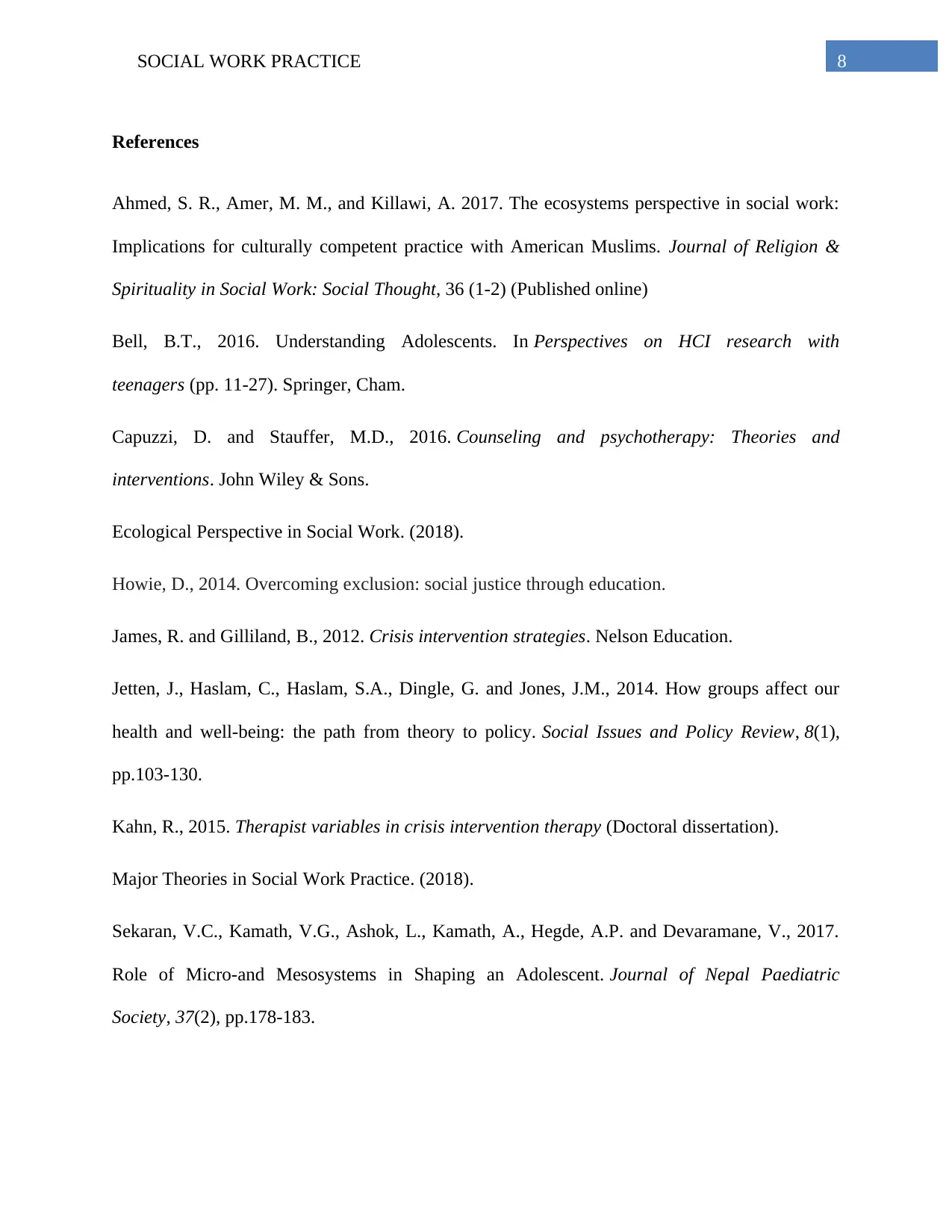
8SOCIAL WORK PRACTICE
References
Ahmed, S. R., Amer, M. M., and Killawi, A. 2017. The ecosystems perspective in social work:
Implications for culturally competent practice with American Muslims. Journal of Religion &
Spirituality in Social Work: Social Thought, 36 (1-2) (Published online)
Bell, B.T., 2016. Understanding Adolescents. In Perspectives on HCI research with
teenagers (pp. 11-27). Springer, Cham.
Capuzzi, D. and Stauffer, M.D., 2016. Counseling and psychotherapy: Theories and
interventions. John Wiley & Sons.
Ecological Perspective in Social Work. (2018).
Howie, D., 2014. Overcoming exclusion: social justice through education.
James, R. and Gilliland, B., 2012. Crisis intervention strategies. Nelson Education.
Jetten, J., Haslam, C., Haslam, S.A., Dingle, G. and Jones, J.M., 2014. How groups affect our
health and well‐being: the path from theory to policy. Social Issues and Policy Review, 8(1),
pp.103-130.
Kahn, R., 2015. Therapist variables in crisis intervention therapy (Doctoral dissertation).
Major Theories in Social Work Practice. (2018).
Sekaran, V.C., Kamath, V.G., Ashok, L., Kamath, A., Hegde, A.P. and Devaramane, V., 2017.
Role of Micro-and Mesosystems in Shaping an Adolescent. Journal of Nepal Paediatric
Society, 37(2), pp.178-183.
References
Ahmed, S. R., Amer, M. M., and Killawi, A. 2017. The ecosystems perspective in social work:
Implications for culturally competent practice with American Muslims. Journal of Religion &
Spirituality in Social Work: Social Thought, 36 (1-2) (Published online)
Bell, B.T., 2016. Understanding Adolescents. In Perspectives on HCI research with
teenagers (pp. 11-27). Springer, Cham.
Capuzzi, D. and Stauffer, M.D., 2016. Counseling and psychotherapy: Theories and
interventions. John Wiley & Sons.
Ecological Perspective in Social Work. (2018).
Howie, D., 2014. Overcoming exclusion: social justice through education.
James, R. and Gilliland, B., 2012. Crisis intervention strategies. Nelson Education.
Jetten, J., Haslam, C., Haslam, S.A., Dingle, G. and Jones, J.M., 2014. How groups affect our
health and well‐being: the path from theory to policy. Social Issues and Policy Review, 8(1),
pp.103-130.
Kahn, R., 2015. Therapist variables in crisis intervention therapy (Doctoral dissertation).
Major Theories in Social Work Practice. (2018).
Sekaran, V.C., Kamath, V.G., Ashok, L., Kamath, A., Hegde, A.P. and Devaramane, V., 2017.
Role of Micro-and Mesosystems in Shaping an Adolescent. Journal of Nepal Paediatric
Society, 37(2), pp.178-183.
⊘ This is a preview!⊘
Do you want full access?
Subscribe today to unlock all pages.

Trusted by 1+ million students worldwide

9SOCIAL WORK PRACTICE
1 out of 10
Related Documents
Your All-in-One AI-Powered Toolkit for Academic Success.
+13062052269
info@desklib.com
Available 24*7 on WhatsApp / Email
![[object Object]](/_next/static/media/star-bottom.7253800d.svg)
Unlock your academic potential
Copyright © 2020–2026 A2Z Services. All Rights Reserved. Developed and managed by ZUCOL.




